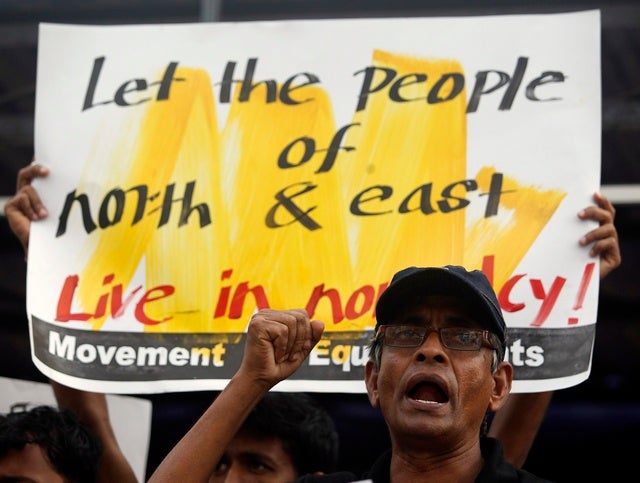
member of an equal rights movement shouts slogans during a protest against the government in Colombo on December 18, 2012.
by Human Rights Watch, New York, February 1, 2013
-
JANUARY, 2013
The Sri Lankan government needs to address the many problems that undermine basic rights for people in the war-torn North and East. Justice and accountability for abuses, an end to torture in detention, and ending constraints on basic liberties continue to prove elusive for the Tamil population.
(London) – The Sri Lankan government continued its assault on civil society and failed to take meaningful steps towards accountability for war crimes during the country’s armed conflict that ended in 2009, Human Rights Watch said in itsWorld Report 2013 released today.
In its 665-page report, Human Rights Watch assessed progress on human rights during the past year in more than 90 countries, including an analysis of the aftermath of the Arab Spring.
There was no fundamental progress on key human rights issues in Sri Lanka over the past year, Human Rights Watch said. Overly broad detention powers remained in place under various laws and regulations, leaving several thousand people detained without charge. State security forces committed arbitrary arrests and torture, including sexual assault, against ethnic minority Tamils. Repatriated Tamils allegedly linked to the defeated Liberation Tigers of Tamil Eelam (LTTE) were at particular risk, Human Rights Watch research found. While the Tamil population in the north benefitted from greater access by humanitarian groups, the military presence kept living conditions from being normalized.
“The Sri Lankan government needs to address the many problems that undermine basic rights for people in the war-torn North and East,” said Brad Adams, Asia director at Human Rights Watch. “Justice and accountability for abuses, an end to torture in detention, and ending constraints on basic liberties continue to prove elusive for the Tamil population.”
The UN Human Rights Council, responding to the government’s prolonged failure to investigate alleged laws of war violations, adopted a resolution in March 2012 calling on Sri Lanka to take all necessary steps to ensure justice and accountability. It requested that the government expeditiously present a comprehensive plan detailing the steps it had taken to implement the recommendations of its own Lessons Learnt and Reconciliation Commission and address accountability. The government replied with an ambiguous “action plan” that presents unrealistic timetables and flawed processes for it to probe civilian deaths and prosecute alleged perpetrators. The government has yet to publicly release any information about concrete steps it has taken towards implementing the recommendations set out in the Human Rights Council resolution.
The government demonstrated further disregard for human rights protections when, during its Universal Periodic Review before the Human Rights Council in November 2012, it rejected 100 recommendations from member states, including some that have a direct impact on accountability.
“UN member states have made it clear through the Human Rights Council resolution in March and the Universal Periodic Review hearings in November that Sri Lanka needs to make fast and meaningful progress on its rights commitments,” Adams said. “The Sri Lankan government should recognize that its past stalling tactics have run their course and that it will need to take real action.”
President Mahinda Rajapaksa and his brothers continued the trend of recent years to accumulate power at the expense of democratic institutions, including the judiciary, and constrict free speech and association. The government targeted civil society through threats and surveillance. Statements by government officials and government-controlled media named and threatened human rights defenders who called for accountability for wartime abuses or criticized other government policies.
“There is ample evidence that Sri Lanka’s current government acts to serve its own interests at great cost to democratic institutions and equal treatment of all communities,” said Adams.
Local activists expressed deep concern about the security of their staff and the people they assist. The government shut down at least five news websites critical of the government in 2012 and put in place onerous registration requirements and fees for all web-based media services. The former editor of theSunday Leader newspaper reported being threatened by Defence SecretaryGotabaya Rajapaksa for publishing an article critical of him.
“When a government fails to protect the rights of its citizens, the need for international action increases,” Adams said. “The international community in 2012 focused renewed attention on Sri Lanka, and given the lack of progress on accountability and the shrinking political space, should continue to do so.”